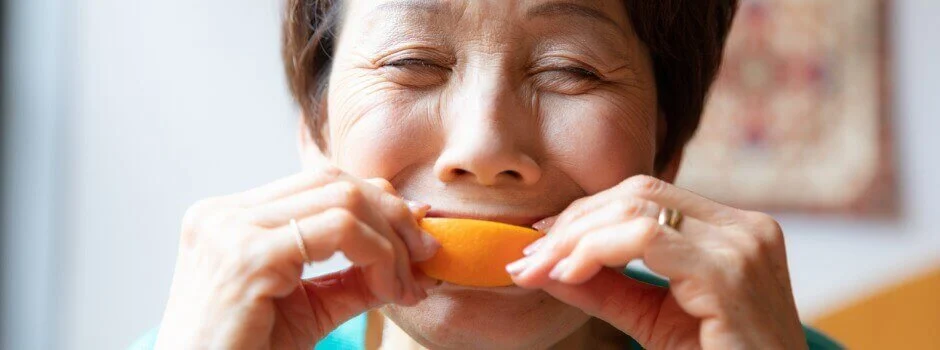Eating the right foods can help control weight and manage or prevent various diseases, including heart disease, high blood pressure, type 2 diabetes, osteoporosis, and some cancers. Maintaining a healthy diet also means addressing physical, social, and environmental changes.
Valari Taylor, a registered dietitian at InnovAge’s PACE center in
Albuquerque, New Mexico, explains, “As we get older, our bodies and lives change, and so does what we need to stay healthy. It’s important to keep sharing those changes [with your doctor] so we can help you adjust to your needs.”
Changes to pay attention to include suddenly living alone or having trouble getting around, issues that make chewing or swallowing more difficult, medicines that make your mouth dry or impact your appetite, and not having as much money for necessities, such as food or medicine.
A Whole Body Approach
“Participants get a physical and nutritional assessment every year. We go over lab results. We check their living situation. This helps us understand the realities and nutritional needs of each participant. For example, unintentional weight loss or wounds that are new, not healing, or getting worse, may require additional nutritional supplements or other help,” says Valari. “We also work with a speech therapist to identify the safest food textures when someone has difficulties swallowing.”
Making a Meal Plan
“As a registered dietitian, my goal is to ensure that every participant in our program has access to healthy foods that are also nourishing and safe to eat,” Valari says. In general, Valari advises those over 50 to eat a variety of foods from each of these three categories:
- Vegetables: 2-3 Servings per Day. One serving = 2 cups of uncooked leafy vegetables or one cup of cut-up vegetables.
- Fruits: 2 Servings per Day. One serving = 1 cup of cut-up fruit or a whole small apple or peach.
- Grains: 5-6 Servings per Day. One serving = a slice of bread, a small tortilla, a cup of cereal, or a ½ cup of cooked rice, or pasta, or ready-to-eat cereal.
Flexibility is important. “It helps you choose a diet of nutritious foods and drinks that you like, are available in your area, and fit your budget.” Valari adds, “Being thoughtful of your whole body and what it needs, whatever age and condition you are in, can have a big impact on your quality of life.”
Valari is part of the InnovAge
Program of All-inclusive Care for the Elderly (PACE) care team. Visit our
nutrition page to learn more about our InnovAge dietitians. You can also take this
self-assessment to find out if InnovAge PACE is a good fit for you or your loved one.
